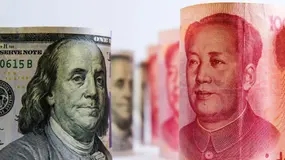GEMFOREX - weekly analysis
Abstract:Top 5 things to watch in markets in the week ahead
The U.S. is to release what will be closely watched inflation numbers this week as investors assess whether the Federal Reserve can pause rate hikes next month. The Bank of England is expected to hike rates again, China releases more economic data and oil prices continue to struggle.
1.Inflation numbers
The U.S. is to release April inflation data on Wednesday with economists expecting the core consumer price index, which excludes volatile food and fuel prices, to increase by 5.5% on a year-over-year basis, after a 5.6% increase a month earlier. The headline rate of inflation is expected to increase by 5% annually.
That would indicate that while price pressures are moderating, they remain sticky.
The U.S. central bank delivered its tenth straight interest rate increase last week, as widely expected, but indicated that it may pause its aggressive tightening campaign at its next meeting in June.
A weaker-than-expected reading would bolster expectations for a Fed rate cut later this year but an above forecast print would support the case for the Fed to keep rates higher for longer.
Fridays employment report for April showed that jobs growth and wage gains remain resilient, undercutting fears over the prospect of a recession. As well as the CPI numbers, the economic calendar also features the producer price index on Thursday along with weekly numbers on initial jobless claims.
2.Sell in May?
The old adage “Sell in May and go away” refers to the idea that May is the ideal time to take profit on equities and stay out of the stock market until after the summer.
It is based on the premise that the best six-month period of the year for stock market returns is November to April, while the leanest is May to October.
Over the last 50 years, the S&P 500 has gained an average of 4.8% between November and April, and just 1.2% between May and October, according to Reuters calculations.
However, this pattern fades over a shorter time frame.
Over the last 20 years, the out-performance of November-April over May-October narrows to 1%. Over 10 years, November-April has underperformed May-October by 1 percentage point and over the last five years, it's underperformed by 3 percentage points.
3.Bank of England
The Bank of England is expected to raise interest rates by another 25 basis points on Thursday as it continues its battle against inflation.
Inflation in the U.K. is running at 10.1%, markedly higher than in the Eurozone, exacerbated by soaring food costs and shortages in the labor market linked to Brexit, keeping wages high.
The combination of high inflation and a tight labor market are fueling bets for further rate hikes this year so the central banks updated projections for growth and inflation will be closely watched.
The day after the BOE decision the U.K. is to release data on first quarter GDP which is expected to indicate that growth remained weak in the first three months of the year.
4.Oil price slide
Oil prices rebounded on Friday but posted a third straight weekly decline amid persistent concerns over the demand outlook.
Benchmark Brent ended the week down around 5%, while crude oil dropped 7%, even after the rebound on Friday. Both benchmarks were down for three weeks in a row for the first time since November.
Prices received a boost after Fridays robust U.S. jobs report eased concerns over the prospect of a downturn in the economy.
“Rather than underlying fundamentals, the selling frenzy over the past week has been driven by worries about demand linked to recession risks and the strain in the U.S. banking sector,” said PVM oil market analyst Stephen Brennock.
“The upshot is that there is a big disconnect between oil balances and oil prices.”
Commerzbank analysts noted oil demand concerns were overblown and expect a price correction upward in coming weeks.
5.China data
A string of economic data out of China in the coming week will offer further insight into the uneven post-COVID recovery in the worlds second-largest economy.
April trade data is due out on Tuesday and is expected to show exports slowed after a surge higher in March.
Inflation figures for April are due on Thursday and are expected to show that price pressures are weakening.
Data last week showed that activity in China's manufacturing sector unexpectedly shrank in April, adding to pressure on policymakers to boost an economy struggling to sustain momentum amid subdued global demand and persistent weakness in the property sector.
Analysts warn that the momentum could further ease as domestic consumption has yet to fully recover, and that more policy support is needed.
Source: investing.com
Trade Different With GEMFOREX
Read more

Breaking: USD/JPY Breaks Through 1 Year Highs
USD/JPY just broke through 1-year highs earlier than expected.
U.S Dollar Gains Against Other Majors.
A Good Week For the US Dollar As It Gains Strongly Against Other Major Pairs.

Chinese Yuan makes new highs marking an historic performance.
Performance like this hasn't been seen since 2021

EUR/USD Weekly Forecast: Wavers Ahead of US NFP Data
The EUR/USD pair ended the week in the red last week as many investors remained in a holiday mood. It was trading at 1.1720, down slightly from last year’s high of 1.1910 ahead of key events this week.
WikiFX Broker
Latest News
If you haven't noticed yet, the crypto market is in free fall, but why?
Emerging Markets: Nigeria's Debt Market Valuation Hits N99.3 Trillion
SkyLine Guide 2026 Thailand — Official Launch of the Judge Panel Formation!
JRJR Review: The Anatomy of a Hong Kong Liquidity Trap
South Africa Macro: Mining Policy Risks Cloud GNU Economic Optimism
JPY In Focus: Takaichi Wins Snap Election to Become Japan's First Female Leader
Vebson Scam Exposure: Forex Withdrawal Failures & Fake Regulation Warning
Amaraa Capital Scam Alert: Forex Fraud Exposure
Galileo FX Exposure: Allegations of Fund Losses Due to Trading Bot-related Issues
EGM Securities Review: Investigating Multiple Withdrawal-related Complaints
Rate Calc

